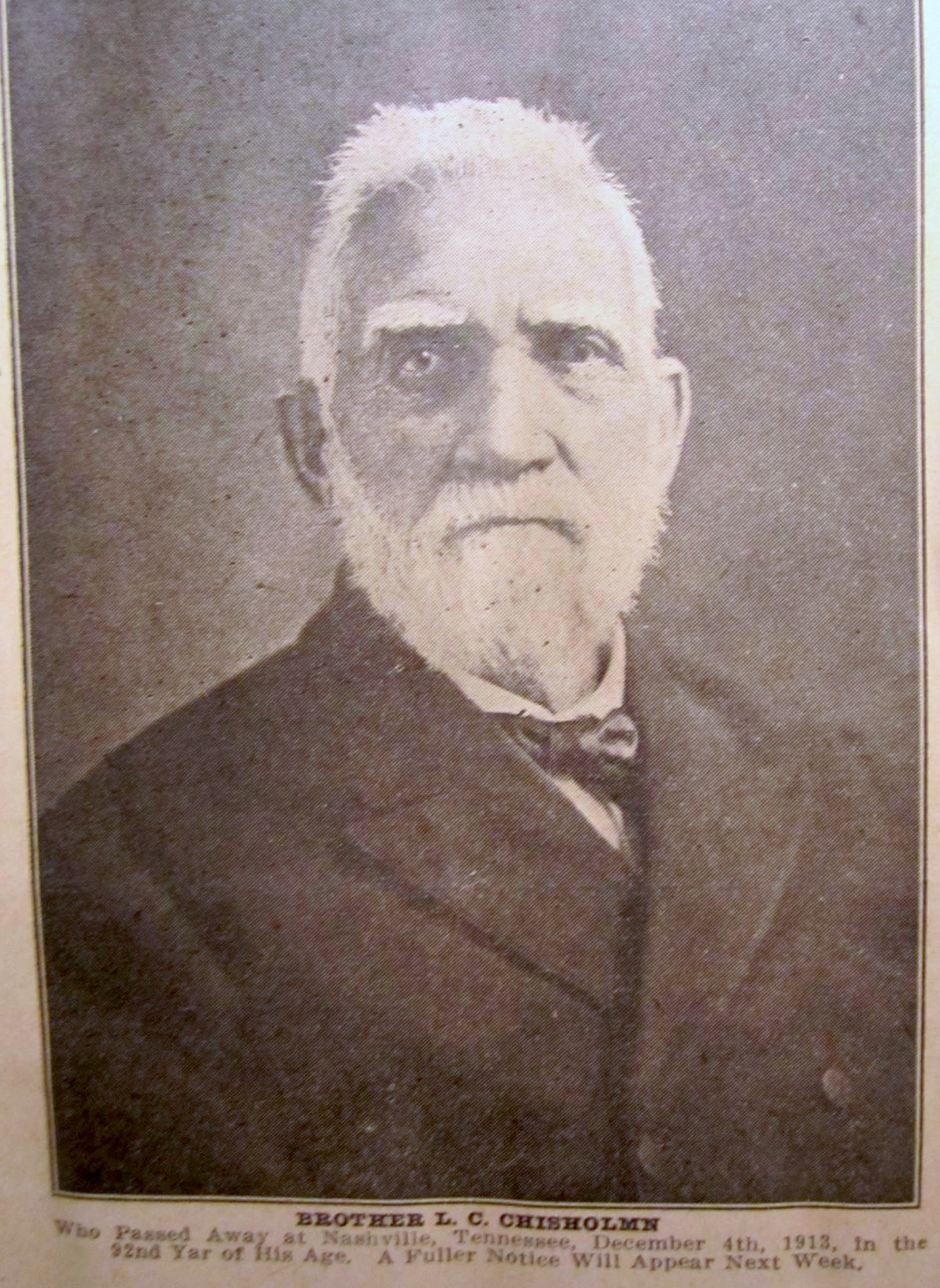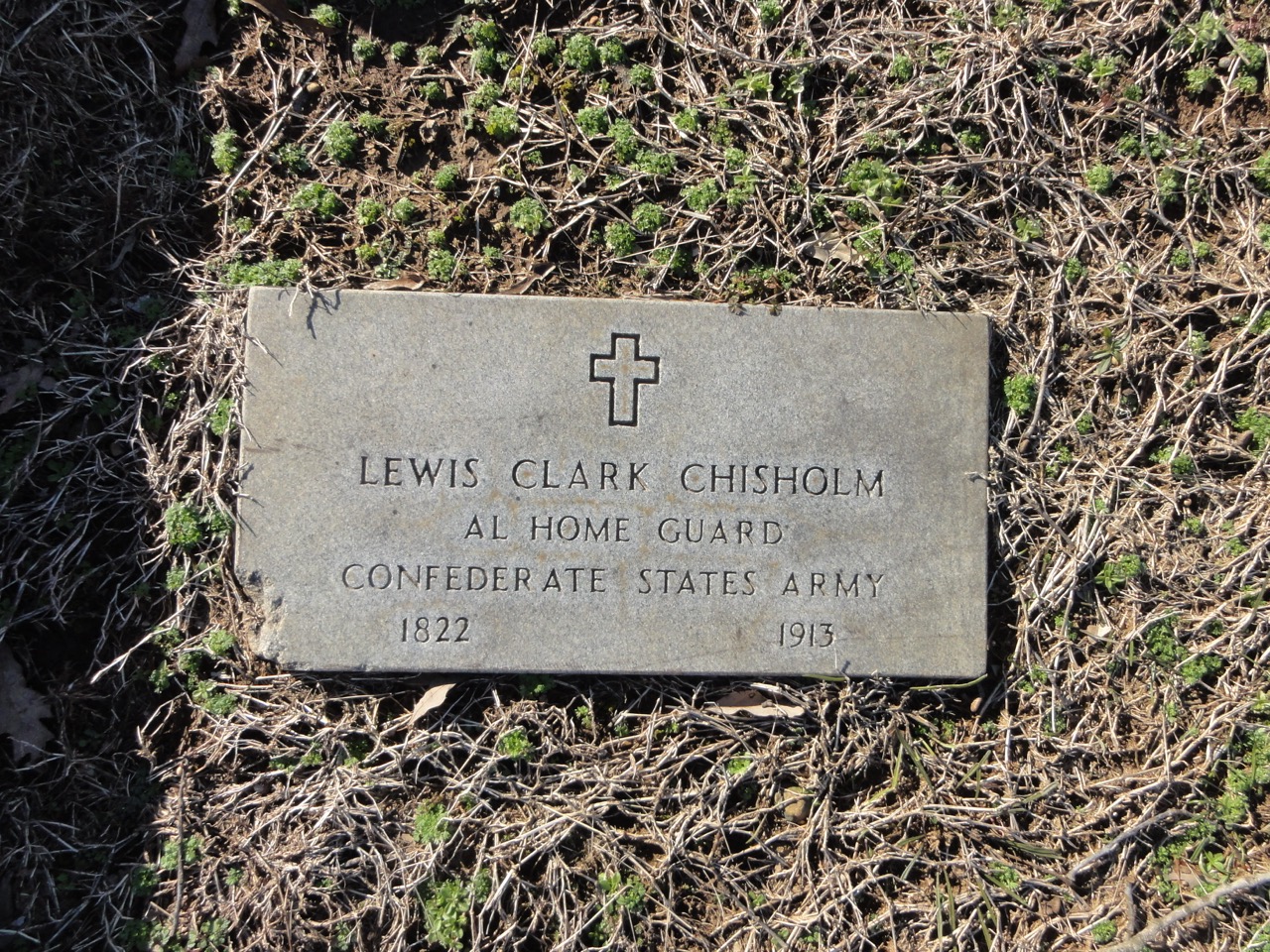Dr. Lewis Clark Chisholm
1822-1913
![]()
The Life of L. C. Chisholm
Dr. L. C. Chisholm was a faithful member of the church of Christ for over seventy years, and a century after his death, he serves as an example of a Christian gentleman—a man of high moral character and integrity. Chisholm was born in Tuscumbia, Alabama, on May 20, 1822, and died at the “ripe old age” of ninety-one years in Nashville, Tennessee, on December 3, 1913.
L. C. was the son of Gillington and Cynthia Hill Chisholm. Cynthia’s brother was Abner Hill, a preacher who was associated with John Mulkey before Mulkey left the Baptists, and one of the preachers from the Stockton Valley (Kentucky) Baptist Association who left the Baptists to restore New Testament Christianity. Abner Hill was a Justice of the Peace in Tuscumbia in 1820 and probably arranged the first gospel meeting held in Franklin County (which at the time included Colbert County). The extent of the meeting is not known, but what is known is that John Mulkey came to Tuscumbia from Tompkinsville, Kentucky, and preached in this meeting. Mansel W. Matthews who was living in Lauderdale County, Alabama, at the time, was baptized in Spring Creek at Tuscumbia in this meeting in the year 1823. Matthews would spend the next seventy years preaching the gospel. Abner Hill relates in his autobiography that his brother-in-law, Gillington Chisholm, requested Hill to baptize him. A few years later in 1834, Dr. W. H. Wharton established the church in Tuscumbia. From early childhood, L. C. Chisholm had heard the ancient gospel preached many times.
Chisholm was baptized into Christ for the remission of sins during the great gospel meeting in Russellville, Alabama, in 1842, when Tolbert Fanning’s preaching converted two-thirds of the households in Russellville. This great meeting in Russellville resulted in over one hundred obeying the gospel and a church being established.
The only male Christian in Russellville, Alabama, before Fanning's great meeting was Dr. Samuel Sevier, son of John Sevier, first governor of Tennessee. No doubt, as a result of the sharing of religious convictions between the Sevier family and the Chisholm family, three of Gillington Chisholm’s children married three of the Dr. Samuel Sevier’s children. L. C. Chisholm married Jane Sevier. Malinda Chisholm, married Archibald Sevier. Mary Chisholm married Dr. Daniel Vertner Sevier, a long time physician in Frankfort and Russellville, Alabama Soon after L. C. was converted by Tolbert Fanning, he decided he would attend Tolbert Fanning's college at Elm Crag (later to become Franklin College) where Fanning served as president. He did so in 1843 but only remained a short time, stating that Elm Crag did not suit his wants, and enrolled at the Old Lasea College, in Maury County, Tennessee, under the direction of John M. Barnes where he remained three years. He later pursued training in dentistry and became a very successful dentist in Tuscumbia, Alabama.
Chisholm did some preaching, but it seems that his preaching was infrequent. He is, however, listed as the preacher of the Russellville (Alabama) Church of Christ in 1849 by The Yearbook of the Disciples. During the time L. C. Chisholm was preaching in Russellville, his father-in-law, Dr. Samuel Sevier, died. Dr. Chisholm reported the death to Alexander Campbell, and Campbell published it in February 1850 on p. 114 of the Millennial Harbinger. It is obvious from his writing that Chisholm held his father-in-law in high regard. The following is part of the obituary that Chisholm wrote:
RUSSELVILLE, Ala., Nov. 17, 1849. Died, at his residence in Russelville (sic), Ala., on Thursday, October 25th, at 3 o'clock, Dr. SAMUEL SEVIER, (son of John Sevier, former Governor of Tennessee,) in the 65th year of his age, after an illness of several months, which he bore with calm and Christian resignation. He left, to lament the irreparable loss, an affectionate wife and eight children-four having gone before, and are doubtless with him in that house not made with hands, eternal in the heavens. He united with the Christian brethren in the year 1825, having been a member of the Methodist Episcopal Church some six years previous, and for twenty-four years of toil and care fought under the banner of Prince Emmanuel, bearing the persecution and scorn of wicked men for his name's sake.
He was a kind and affectionate husband; a pious and exemplary father. During the whole time of his affliction he ceased not to exhort his children to hold out faithful unto the end; and when death came, (for which he had so frequently prayed,) to relieve him from his sufferings, with a smile he folded his arms, commended his spirit to that God who gave it, and breathed his last. Thus he fought a good fight, finished his course, kept the faith, and henceforth there is laid up for him a crown of righteousness, which the Lord, the Righteous Judge, shall give at that day; and not to him only, but unto all them that love his appearing. Dr. Chisholm’s professional success translated to material wealth, and Chisholm became the owner of one of the most beautiful homes in Tuscumbia, Alabama. The home known as “Locust Hill” still stands today. Built in 1823 by Colonel William Winter, the house is described as “having fine proportions, great chimneys, and handmade-brick walls thirteen inches thick, windows with deep reveals, and charming woodwork.” Chisholm bought the house prior to the Civil War.
On February 22, 1863, Union cavalry under command of Colonel Florence M. Cornyn attacked Tuscumbia, and Cornyn chose the home of Dr. L. C. Chisholm as his headquarters. From there, orders were given to wreak havoc on the town. Cornyn’s 1,200 man brigade was dubbed the “Destroying Angels.” Composed of units from Missouri and Ohio, they were joined by the 1st Alabama, USA, a unit of Southerners primarily from Winston County, Alabama, who refused to fight for the South and joined the Union Army.
Cornyn’s men camped in Tuscumbia. They tore down fences belonging to private residences to use for firewood, and helped themselves to the contents of nearby homes, devastating the people of Tuscumbia. They carried off everything in the smoke houses. They also took all the flour, and other food items. The soldiers used shocking gestures and crude language toward the women. When complaints were made to Cornyn, he made it clear he did not care what his men did. Some of the citizens were required to pay ransom to keep their homes from being burned.
This was the man who made his headquarters in the home of Dr. L. C. Chisholm. This writer toured Locust Hill and the current owners, the Gilchrists, showed me their home. We were shown a bloody stain on the hardwood floor as one enters the parlor of the home. The blood evidently dried on the floor, staining the wood. Even after numerous cleanings over the past 150 years, the bloody footprint stain is still visible. The stain is an ever present reminder of injury and death that resulted from the Civil War. According to oral history, the home was used as a hospital for the wounded and many were cared for at the home. Probably, Dr. Chisholm’s services were required to provide medical attention to the wounded. Perhaps Locust Hill remains today because of its use to the Union Army while in Tuscumbia.
Shortly after the atrocities in Tuscumbia, Dr. Chisholm’s wife, Jane, died, and Dr. Chisholm moved his family to Nashville, Tennessee. There he became a neighbor and close friend of James E. Scobey, a gospel preacher and former professor at Franklin College. Dr. Chisholm also became closer to Tolbert Fanning, the man whose preaching converted him to Christ over twenty years earlier. When Scobey was making preparations to write his book, Franklin College and Its Influences, Scobey asked L. C. Chisholm to contribute to the book. The following are a few of Chisholm’s comments about Fanning:
With this long and intimate acquaintance, I can truly say that Tolbert Fanning had but few, if any, equals in his day. He was a strong man from every standpoint. As an educator, he had no peer in Tennessee. His work along that line gives ample proof of the fact. As a public speaker, his style was simply inimitable. His voice was strong, and his articulation was distinct. As a preacher, he was always logical and scriptural. He appealed to the common understanding of his audience, holding it spellbound to his subject. As a neighbor, he was kind and generous. He was energetic and pushing in all his business. In worship he was humble and fervent in spirit. But, like all Adam's race, he had his likes and dislikes, and made no pretensions to perfection. He loved the dog and the horse, and delighted in seeing them brought up to their highest capacity. For this he was often criticised (sic), even by his brethren, and often maligned and misrepresented by religious enemies; but he was as indifferent to all these charges as the limestone rocks of Elm Crag. (Franklin College and Its Influences, by James E. Scobey, p. 219)
One of the fond remembrances Chisholm had of Franklin College was, while a student at Old Lasea, he returned to Franklin College one summer and became a part of a school trip to Huntsville, Alabama, with several professors and young men who were talented in singing. It was customary for college students to take trips with different professors to study or perform, as the case may be. The story of the young men from Franklin College performing in Huntsville, Alabama, is the story we shall relate.
When we reached Huntsville, Ala., we pitched our tent hard by the city, and announced a free concert in the courthouse that night (Friday). We had a fair audience, and the young men did full justice to the occasion. In the meantime the professors, who were all young men, began to be introduced to the young ladies of the city; and the boys followed their example, till the city was all aglow with promenades, flowers, and bouquets. The boys seemed to be on stilts, and at night the courthouse was jammed, while flowers showered like meteors upon the musicians. When the time came (to leave Huntsville), nearly every student and professor had a sweetheart that he must tell good-by. Finally he got them "rounded up," and we all had to double-quick to make the barbecue [in Savannah, Tennessee]. (Franklin College and Its Influences, by James E. Scobey, pp. 218-219)
The Chisholm family was neighbors not only to Professor James E. Scobey, but also to Tolbert and Charlotte Fanning. Chisholm said:
I lived a near neighbor to Mr. Fanning and worshiped in the same congregation with him to the close of his eventful life. In speaking of Tolbert Fanning's death, Chisholm said, “Mr. Fanning's death was premature, and resulted from his strong will. He died from internal hemorrhage from the following cause: One of Fanning's prize bulls had lunged at him, and came near killing him upon the spot; but he was carried to the house, and doctors were called in. Chisholm said he was with Fanning when he died.
I was with him night and day till he died. On that Sunday morning it was evident to him that the end was rapidly approaching, and he requested the brethren to hold services in his room. Though it was clear to all present that, he was rapidly sinking, he directed the entire service. A few minutes later two of his neighbor gentlemen called in. He called each by name and asked them to be seated. In less than five minutes he breathed his last, as if dropping off into a restful sleep.
When Dr. Chisholm died on December 3, 1913, after taking ill of pneumonia, a memorial service was held in Nashville with James E. Scobey and T. B. Larimore each speaking his thoughts in harmony with the occasion. The body was transported back to Tuscumbia, Alabama for burial. James E. Scobey, Chisholm’s dear friend and neighbor, accompanied the body to Tuscumbia and spoke at the burial in Tuscumbia’s Oakwood cemetery. His message is recorded in the December 18, 1913 issue of the Gospel Advocate. He said in part:
My dear friends, we have come to this place to bury the body of Dr. L. C. Chisholm, our friend and brother, not to praise him. He desired his body to rest in this spot on his native heath, at the place where he first saw the light of day over ninety-one years ago. I suppose there is not a man or woman present who played with him in his childhood days. Perhaps some are present who may have known him in his mature manhood. It has been my fortune to know him well in the latter years of his life. For forty-five years past I have observed his walk and conversation as he moved among men.
I have said that we have come to bury him, not to praise him. Still, the time and circumstances seem to demand that I say something in eulogy of the splendid reputation he has made for a devoted, consecrated, Christian man: but the eulogy shall neither be fulsome nor extravagant—a simple recital of bare facts as I see them.
The whole tenor of his life seems to have been attuned to the music of God’s love, which constrained him at all times, to endeavor to walk in the paths of peace and righteousness.
In 1850,* sixty-three years ago, he enlisted as a solider of the cross and began to fight the good fight of faith under the blood-stained banner of the Prince of Peace. The weapons of his warfare were not carnal, but mighty, because he became strong in the Lord and the power of his might. He put on the whole of the Christian armor, and has wielded the sword of the Spirit—the word of God—often to the discomfiture of those who assailed what he conceived to be the truth, both by word and pen. He was a writer of no mean ability. He contributed much to the periodicals published by his brethren. He was a man of strong convictions, and he possessed the courage and the ability necessary to sustain them, if they could be sustained.
He obeyed the gospel and became a Christian under the preaching of that prince of bible teachers and strong defenders of its precepts, Tolbert Fanning, at Russellville, Ala., in 1850.* He determined then and there, by the grace of God, to seek for and obtain the blessing and privileges of the kingdom of Christ on earth, and by a faithful continuance in well doing to seek for glory, honor, and eternal life; and from that day to the close of his earthly career he steadfastly pursued the way that leads to life. He had great faith in God’s goodness and mercy and a confiding reliance in his promises. He had his trials, tribulations, disappointments, and sorrow; but his trusting confidence and hope in God was simply beautiful. In one of the misfortunes which came to him, I wrote him a letter of sympathy. He answered by writing me one; and I want to read you an extract from that letter. He says; “The love of the world is enmity with Christ, and the glory of man is bubble on the ocean of time; but the word of the Lord endureth forever. I, therefore, trust in his promises revealed in the gospel of Christ. By these thoughts, God gives me strength to bear the afflictions of life as a true soldier of the cross. My life is an open book, and whatever the world may think of it shall not turn my mind from trusting in God and his promises in the gospel of Christ: His life should be, and is, a benediction to his family and friends.
Of course, he was not a man without faults; but I never heard his general conduct condemned, his integrity impeached, nor his honesty questioned. He leaves to his children and friends the heritage of a good name. Let them sorrow for him, but not without hope that they may meet him again in the ‘sweet by and by.’ ‘I heard a voice from heaven saying unto me, Write, Blessed are the dead which die in the Lord from henceforth Yea, saith the Spirit, that they may rest from their labors, and their works do follow them.’ Though Chisholm lived the last half of his life in Nashville, his death was reported with great sadness in Tuscumbia, Alabama, where many years before he had erected a gravestone for himself and his two wives who had preceded him in death. The Alabamian-Dispatch newspaper reported the death on Thursday, December 4, 1913, and carried a lengthy obituary on December 11, 1913. The obituary began with the heading, “Death of Dr. Lewis C. Chisholm,” and as a subheading the words, “A Good Man Has Passed O’er The River into the Great and Mysterious Beyond.” In part, the obituary stated:
Dr. Lewis C. Chisholm, for many years a popular resident of Tuscumbia, but late of Nashville, died at the home of his son-in-law, Mr. J. D. Pope, of that city last Friday, after a few days’ illness of pneumonia. Dr. Chisholm was born in this city May 20th, 1822, and practiced dentistry here 50 years ago; He was an active man with a strong, clear mind up to his last illness and gave promise of living past the century mark.”
“He was laid to rest in this city between his two wives, having years ago made all arrangements for his burial.
He had erected his own monument, with his name and date of birth, many years ago, in fact so long ago that the marble had become dark with age. He had arrangements made with the undertaker to chisel the date of his death, which will be done by undertaker Challen of this city. He was a devoted member of the Christian Church and was converted at a meeting held in Russellville 60 years ago. His pastor, Dr. Scoby (sic) who had been a neighbor and intimated friend of Dr. Chisholm and family for many years accompanied the remains with Mr. and Mrs. Pope, and his brother, Dr. Edmund Chisholm, of St. Louis. Dr. Scoby (sic) was assisted in the service by Rev. Colemon of Sheffield. Dr. Scoby (sic) who had been a neighbor and intimate friend for many years delivered a most beautiful and touching eulogy. A selected choir delivered solemn and sacred music, while the remains of the grand old man was laid to rest beneath the great oaks and among the hills of old North Alabama, where he was wont to play in childhood nearly a century ago.
Dr. L. C. Chisholm was laid to rest in the home of his youth. He was buried where he was born, where his parents obeyed the gospel, where he ran and played as a child, and conducted a successful dental practice as an adult. Here he brought his young wife, and it was here that his children were born. He was buried a short distance from Locust Hill, the site of his beautiful home that was ransacked during the Civil War and where his first wife, Jane, died shortly after the atrocities of the Union Army at their home.
Dr. Chisholm is not remembered for his preaching but for his life of faithfulness to Christ. The Church and every community would be much better off today if there were more men like Dr. Lewis Clark Chisholm.
*Professor James E. Scobey records the wrong date of Chisholm’s conversion. It was in early 1842, not in 1850.
-Frank Richey, Vignettes of Virtue, Chapter 12, "Dr. Lewis Clark Chisholm," Florence: Cypress Creek Book Company, c.2010, pps.71-80
Note: Frank Richey's book, Vignettes of Virtue is a great book on several works and people in the early Restoration Movement. Order your copy today at: Vignettes Of Virture.
![]()
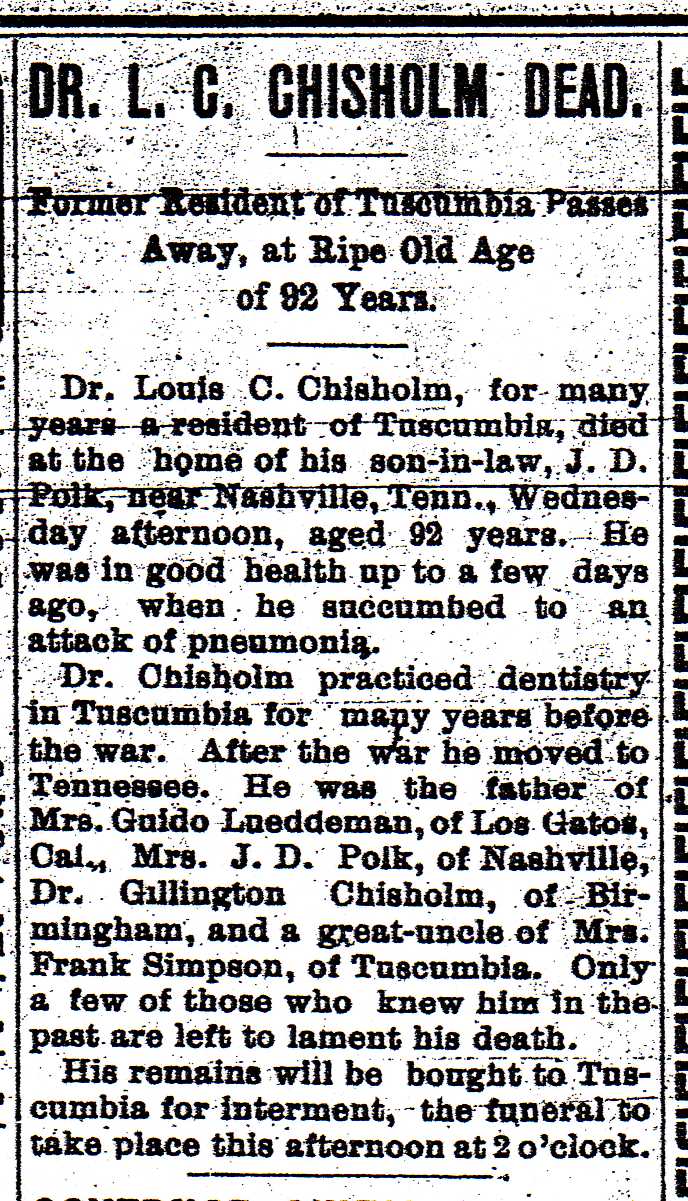
![]()
"Elm Crag" & Tolbert Fanning
by L. C. Chisholm
It is with timidity and a becoming degree of reverence that I attempt to write anything in regard to this remarkable man; but at the request of Prof. James E. Scobey, who is collecting data for a book whose object is to put to record in permanent form as much of his life work as can be gathered at this late day, I have consented to give what I can call to mind during my intercourse with him at various times up to his death.
If I ever came in touch with a broad-minded man, it was Tolbert Fanning. But by this I do not mean he was "broad" in the popular use of that term, which is conservatism and a compromising attitude on all subjects, with antagonism to none. He was as far from that as the east is from the west. His views were as broad as. the realm of creation, yet as circumscribed as the immutable laws of Jehovah. His field of thought embraced the mineral, the vegetable, and the animal kingdom; and his aim in life was to develop all these to the highest degree, to fulfill the sphere assigned to each by their Creator. In his broad conception, every creature had its own mission to fulfill to bless man and honor God. He viewed man as the executive power under God to develop, utilize, and appropriate all according to the divine will. Hence the education of man gave strength to the mainspring of the machinery of creation. Therefore his mind dwelt chiefly upon developing the powers of man. His close observations of the animal creation was marvelous. His judgment. from the domestic fowl, the dog, the pig, the sheep, and the cow to the horse, was not surpassed, if equaled, by any of his day. But as man was the crown piece of creation, his highest interest centered upon his development. Therefore man must be brought into daily contact with vegetable and animal life to learn by experience the best methods of growing and utilizing them for the good of mankind. To this end he bought a tract of land five miles east of Nashville, Tenn., where he established a "manual labor school" for training boys to meet the responsibilities of life. He named the school "Elm Crag," from a craggy bluff near the dwelling, from which flowed a good supply of cool water, shaded around with large red elm trees at that time. His conception of a training school was grand, could his ideas have been practically carried out; but he failed to take in the condition of society. His original plans were for the boys to work part of the time and pay only half the usual expenses, thus enabling many poor boys to obtain an education. But desiring a large patronage, he took boys who paid full expenses without working. This made an unfortunate distinction of pupils. Besides, those boys who worked two or three hours per day felt more like sleep than study on going to the recitation room. It imposed too much upon the working boys to keep up in the same classes with those having all their time for study. He saw his mistake, and admitted it. All should have worked or none. Mrs. C. Fanning profited by this, and very wisely required that all pupils of the Fanning Orphan School should be placed upon a level, so far as domestic work is concerned.
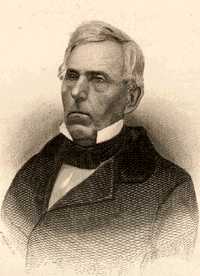 My first acquaintance with Mr. Fanning was in 1842 at a big meeting he held in the little town of Russellville, Ala., at which time he had two hundred additions, I being one of the number.
My first acquaintance with Mr. Fanning was in 1842 at a big meeting he held in the little town of Russellville, Ala., at which time he had two hundred additions, I being one of the number.
In 1843 I went to his Elm Crag School, but remained only a short time. I was not pleased with Elm Crag as suited to my wants at the time, and set in with John M. Barnes, who was teaching at Old Lasea, Maury County, Tenn., and remained with him three years.
When Elm Crag merged into Franklin College, I visited it occasionally. During one vacation the students of Franklin College were sent out on excursions. President Fanning, with one lot, went into West Tennessee; Prof. A. J. Fanning, with a party, went to the Mammoth Cave, in Kentucky; while a third party made a geological tour South. My teacher, John M. Barnes, and I went with the latter crowd of about twenty students under the control of Professor Fall, of languages; Professor Loom is, of natural science; and Professor Cook, of music. Among the young men were the pick of the musicians at the college, who gave a free concert at every town or village we passed. The people were so carried away with the music that they gave us an abundance of supplies all along our route (for we camped under a good tent every night).
When we reached Huntsville, Ala., we pitched our tent hard by the city, and announced a free concert in the courthouse that night (Friday). We had a fair audience, and the young men did full justice to the occasion. The next morning a committee of gentlemen came to our tent and notified us that the city authorities had arranged with the two hotels for our accommodations free of charge while we remained there. The professors gladly accepted. Our camp equipage was taken in charge, and we were all assigned rooms in the two hotels.
Announcement was made at once for a free concert at night. In the meantime the professors, who were all young men, began to be introduced to the young ladies of the city; and the boys followed their example, till the city was all aglow with promenades, flowers, and bouquets. The boys seemed to be on stilts, and at night the courthouse was jammed, while flowers showered like meteors upon the musicians.
On Sunday, Professor Barnes preached a big discourse, and all the afternoon and night was spent by the young men in gallanting his lovely Huntsville girl.
On Monday morning we were to move on, according to our programme; but another committee waited upon the professors, J. F. Demoville being the speaker, insisting upon a concert for the special benefit of the old people, in which an anthem, "The Earth is the Lord's and the Fullness Thereof," must be rendered. It took but little suasion to carry the point. On Monday night the old people of Huntsville had the front seats, and two courthouses could not have seated the crowd. Professor Cook, with all his boys, felt the magnitude of the occasion, and surpassed themselves on all former occasions, to the delight of all present.
On Tuesday morning we had to leave early to reach a barbecue which we had been notified would be given us at Savanah, Ala. When the time came, nearly every student and professor had a sweetheart that he must tell good-by. Huntsville girls did not rise in those days in time for calls from young men and give them a very early start; but there was no use in grumbling, for that call had to be made by the professors especially, if it consumed half the day. For a time the boys had no leader, till young Carmack, of Mississippi, assumed the role of leader and sent messengers all over the city to find the professors. Finally he got them "rounded up," and we all had to "double-quick" to make the barbecue.
From that time on the interest in geology seemed to fag.
But to return. My acquaintance with Mr. and Mrs. Fanning had impressed me that they both were the most trustworthy educators in the Southern States. At the close of the war we entered some of our children in their schools. In 1867 we moved to Franklin College, mainly for school advantages, and settled near the school, placing all our children under their instruction.
I lived a near neighbor to Mr. Fanning and worshiped in the same congregation with him to the close of his eventful life. With this long and intimate acquaintance, I can truly say that Tolbert Fanning had but few, if any, equals in his day. He was a strong man from every standpoint. As an educator, he had no peer in Tennessee. His work along that line gives ample proof of the fact. As a public speaker, his style was simply inimitable. His voice was strong, and his articulation was distinct. As a preacher, he was always logical and scriptural. He appealed to the common understanding of his audience, holding it spellbound to his subject. As a neighbor, he was kind and generous. He was energetic and pushing in all his business. In worship he was humble and fervent in spirit. But, like all Adam's race, he had his likes and dislikes, and made no pretensions to perfection. He loved the dog and the horse, and delighted in seeing them brought up to their highest capacity. For this he was often criticized, even by his brethren, and often maligned and misrepresented by religious enemies; but he was as indifferent to all these charges as the limestone rocks of Elm Crag.
Mr. Fanning's death was premature, and resulted from his strong will. He died from internal hemorrhage from the following cause: He went out to the lot, as usual, to see the stock. He ordered Frank Manier to lead out of his stall a fine bull. Prank hesitated, saying, "I am afraid of the animal," which rather vexed Mr. Fanning; and he stepped in to do the work. The bull made a lunge at him, and came near killing him upon the spot; but he was carried to the house, and doctors were called in, and in a week or two he was able to walk around some. One morning soon afterwards he concluded to walk to the lot. On returning, he made some exertion getting over the steps, and felt some internal viscera break or tear loose, from which he suffered great agony from Thursday morning till Sunday at 11:30 A. M., when death came to his relief. I was with him night and day till he died. On that Sunday morning it was evident to him that the end was rapidly approaching, and he requested the brethren to hold services in his room. Though it was clear to all present that, he was rapidly sinking, he directed the entire service. After the communion, the brethren seemed to forget to sing and dismiss the audience; but he said: "Sing, brethren, and dismiss the audience." They did so, with much emotion. A few minutes later two of his neighbor gentlemen called in. He called each by name and asked them to be seated. In less than five minutes he breathed his last, as if dropping off into a restful sleep. Thus passed away one of Tennessee's greatest benefactors. His work in agriculture, horticulture, and stock raising went far toward building up the State along these lines. The influence of his writing and preaching cannot be estimated. He and his wife leave behind them a fitting monument of praise to their life's work in the Fanning Orphan School.
L. C. CHISHOLM, Franklin College And Its Influences, pages 215-220
![]()
Contributed by Terry J. Gardner, 06.2012
![]()
Directions To The Grave Of L.C. Chisholm
Dr. L.C. Chisholm is buried in the Oakwood Cemetery in Tuscumbia, Alabama. From the Hwy. 72 and Hwy 43 intersection in Tuscumbia head west toward Corinth. In less than a mile take a right on William F. Gardner Avenue. The cemetery will be on your left.
GPS Location
34.72426,-87.689708
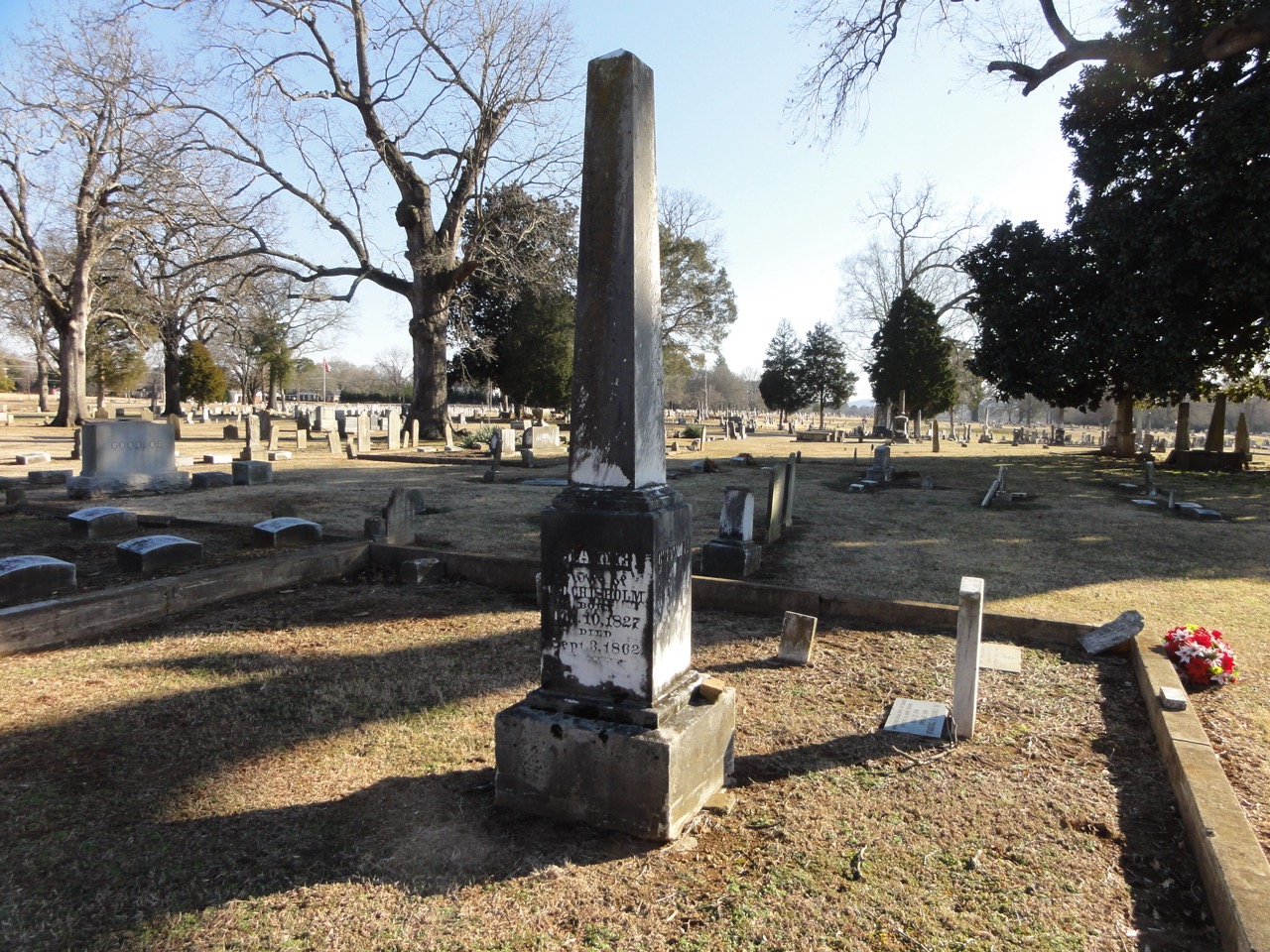
Jane
wife of
L. C. Chisholm
Born
June 10, 1827
Died
September 3, 1862
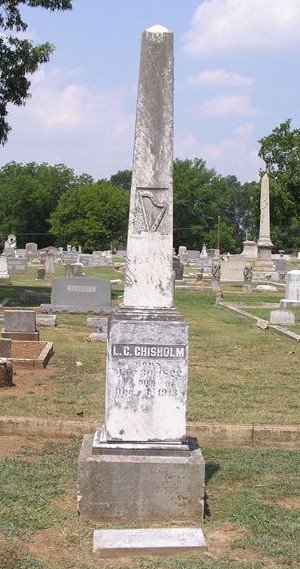
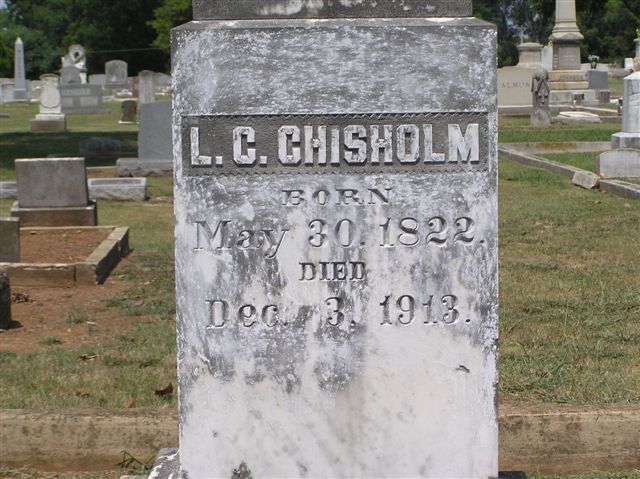
Lewis Clark Chisholm
AL Home Guard
Confederate States Army
1822-1913
![]()

